Sunday of Luke 8:5-15
and of Holy Fathers from the 7th Ecumenical Council of Nicaea
350 holy Fathers of the Seventh Ecumenical Council, which gathered in Nicaea in 787 under the holy Patriarch Tarasius and during the reign of the Empress Irene and her son, Constantine Porphyrogenitus, to refute the Iconoclast heresy, which had received imperial support beginning with the Edict issued in 726 by Emperor Leo the Isaurian. Many of the holy Fathers who condemned Iconoclasm at this holy Council later died as Confessors and Martyrs for the holy Icons during the second assault of Iconoclasm in the ninth century, especially during the reigns of Leo the Armenian and Theophilus.
“In this parable, our Savior creates four human typology. The first one represents the careless man. A mystical author and philosopher Sir Kierkegaard, called this type the wing man, or the taster understanding those wondering from flower to flower, seeking the joy of this earthy life and ending with their wings broken and trapped into the dust. These are people who reject God’s word but allow themselves to be dragged by all sorts of ideological, Gnostic or philosophical ideas. They have no stability and are berried by all the wrong teachings of this world; like a wall on which is written all the false ideas of the present and past times. Let us be attentive and reflect who among us is like the earth in which the seed falls but bear no fruit?
The second category is (represented by) those who hear the word of God, receive it with joy, but it is enough for one shadow to overcome them. It is sufficient for one disaster to strike, one persecution as it took place and it is still unfolding in our world today – especially in America where the persecution is very subtle and insidious – for them to be lost. And in many aspects, this is perhaps more dangerous than communism, when we knew who was (doing) good and whom evil. It was as the white and black. Now, we do not know where good and wrong is. Everything is gray shaded. So it is Europe, the “United Europe”. And we identify with those who hear the word of God, receive It and are joyful, then a tribulation strikes, or the hot sun… (cf. Luke. 8: 6) as the parable says. The hot sun warms and dries the soil and the seed from our soul, dies.
You know that in communism, during the religious persecution, those who were patriots had separated easily from the traitors. Some had failed, others had compromised or committed evil, while others had suffered and if they haven’t been arrested, they resisted silently under grounds, praising God to help them in this troubled life. I wondered sometime: … how many people back then, had not compromise religiously?
And I was moved to see in the church, how people raised their arms to God screaming loudly Lord, have mercy on me! while I was reading the prayers for forgiveness and I was saying out loudly every name so that the Lord God may hear their prayers and send His mercy.
I was impressed to see such faith, which you do not find in the West. These spontaneous manifestations of the soul crying out to God.
But I was even more troubled when I saw that many of these people have a dual personality: in the church they are believers, they lit candles, they come and may or may not attend the whole service, but when they leave the church they become like beasts. Brother rises against his brother to fight for a piece of land… they deceive each other in many ways. This is a kind of doubled spirit.
In communism, this kind of duality was very different. Beck then many would listen to the Voice of Europe, went to church, but in public will cry that they do not believe and praised Ceausescu or others. This lie has been perpetuated for a long time.
Nowadays, a new form, more dangerous than before is being perpetuated in our country, because now we no longer fear any religious threat. Now, under the pressure of the times, or under the influence of many theories, or simply because it is convenient, some of us deny God and bring no fruit. Reflect on which one of us fit in this category, or we did not so long ago.
A third category of people are those dominated by passions. And they bear many, all sorts of human passions: fornication, drunkenness, greed, all those passions that make our heart a land filled with weeds, thorns and brambles. And even if the word of God touches us, even if we turn back to Him with love, our passions which we bared for sometime, are stronger than us. And this is because our repentance is not genuine! It’s just a moment of openness towards God which we do not immerse our heart in, we do not make of it the healing source for our soul, we opened for a time then we forget.
Our passions had flared within us stronger than the Call (to Christ) and the virtues that God sows into our heart. And we do not bring forth any fruit, and without fruit we are deemed for eternal punishment. Who among us can identify himself here?
The fourth category of people are those who hear the Word, endeavor in struggle, serving the Lord with joy, are looking to fertilize their spiritual soil, to understand more deeply the word of God; they come to church to confess and commune and do good to those around them, and become a light for the world. Some may struggle less, others more. God has given everyone a talent: to some He gave one talent, to other He gave three talents, and to another He gave five talents. Everyone got something and each of us must bring forth to God a gift equal to the gift he received. Him who got a talent, needs to bring one more. Him who received two talents, let him brings two more, and him who were given five, let him brings five more. He, who bears fruit this way, is truly one who heard the word of God and was fruitful.
And the Lord said also: “He who has ears to hear, let him hear.”
Look around you and within yourself and sincerely see where you are. If you have good intention and do not try to deceive yourself or others, acknowledge exactly where you stand. Then truly, when our Savior had said “He who has ears to hear”, you are those who properly understood.
And your sincere look of where you stand – in this typology that our Savior had created – will convinces me that from now on you will truly begin to serve Christ and to bring forth fruit. Even thought it may seem small, let us strive for it.”
(Taken from: Father George Calciu: “To serve Christ means suffering”, translated by EC)



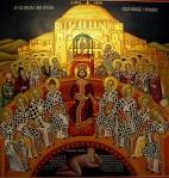 Christian Dogma
Christian Dogma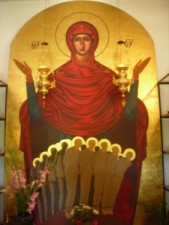 Christian Martyrs
Christian Martyrs Christian Orthodox Churches and Monasteries
Christian Orthodox Churches and Monasteries Christian Sermons and News
Christian Sermons and News Church's Teachings on Fasting
Church's Teachings on Fasting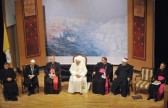 Ecumenism – a Great Heresy
Ecumenism – a Great Heresy Father George Calciu
Father George Calciu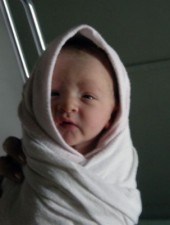 Life_a Sacred Gift form God
Life_a Sacred Gift form God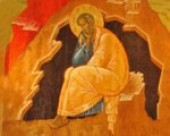 Orthodox Saints and Church Fathers
Orthodox Saints and Church Fathers Spiritual Elders
Spiritual Elders Daily Bible Readings
Daily Bible Readings Journey to Orthodoxy
Journey to Orthodoxy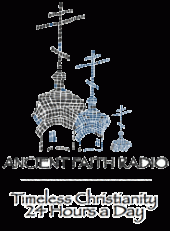 Listen to Ancient Faith Radio
Listen to Ancient Faith Radio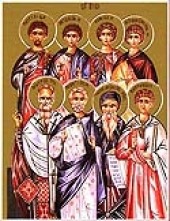 Orthodox Calendar of Feasts and Saints
Orthodox Calendar of Feasts and Saints Orthodox Christian Mission Center
Orthodox Christian Mission Center Orthodox Institute
Orthodox Institute OrthodoxChristianNetwork TV
OrthodoxChristianNetwork TV
1 comment
Comments feed for this article
November 7, 2010 at 5:28 AM
maria louran
I have just discovered this website and am very excited as it is fantastic!
I love the icons, the ability to hear hymns and the written articles.
They are all pure Orthodox and I will pass this site on to others I know.
thank you
with love in Christ
Maria